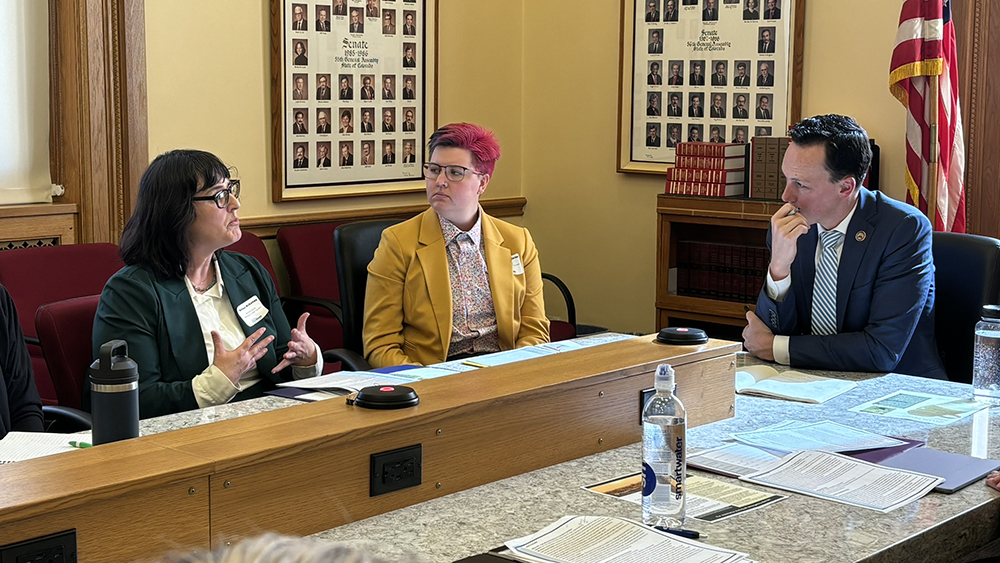- An Alliance For Community Action
- (970) 256-7650
- info@WesternColoradoAlliance.org
Bumpy finish
As the dust settles on the recent legislative session, we wanted to take a moment to reflect on our efforts, celebrate our victories, and learn from our setbacks.
While there were certainly bright spots, the outcome of the session was not as glowing as we had hoped. However, through careful review and analysis of our work over the past week, we have gleaned some important takeaways. These takeaways include learning from our losses, celebrating wins, and analyzing a new regulatory landscape for climate and energy policy in Colorado.
Our priority bill, Regenerative Agriculture Tax Credit (SB24-152), which would have provided a tax incentive to Colorado food and beverage (F&B) businesses like restaurants and breweries to purchase produce and animal products from local farms and ranches that are utilizing, or transitioning to regenerative practices, failed to pass despite strong efforts. This bipartisan bill was led by Western Slope legislators Sen. Cleave Simpson and Sen. Dylan Roberts. However, it failed to receive a final vote before the end of the session.
A similar fate befell Analysis of Universal Health Care (HB23- 1075), a bill working to analyze the possibility of a single payer universal health care system in Colorado. This was not for lack of support for these bills, but rather the political complexities of passing bills in a turbulent legislative session that was fraught with budget battles over income taxes and TABOR surpluses.
One key lesson we learned this year is that success in one chamber does not guarantee success in the other, especially when money is involved. To overcome the challenges of Colorado’s budgeting process, we must win strong support from our lawmakers well in advance of session so that our priorities are in the top tier of issues considered in the budget. We are incredibly thankful to all of the bipartisan bill sponsors who worked to advance these bills and hope to work with them again next session to make them a reality.
West Slope Youth Voice is cheering the passage of Increase Access to School-Based Health Care (SB24-34). This bill was the focus of our youth lobby trip in January where several of our students testified in support of the bill and helped pass it out of committee. This new legislation will significantly expand opportunities for student health access and services across the state.
We are also celebrating success in an emerging priority area for our Alliance, public transit. A shared priority with Gov. Polis and many lawmakers across the state. Methods to Increase Transit (SB24-32), is the first step in building a statewide working group to guide the process of increasing public transportation statewide. We are also pleased to see progress in agriculture and land protection with the Conservation Easement Income Tax Credit (SB24-126), which will provide additional funding to preserve properties in perpetuity, safeguarding them from development.
This session was a mixed bag for climate and energy legislation. We were working hard to pass new safety measures for oil and gas pipelines and to end tax exemptions on low producing wells, but all oil and gas legislation this session ended when Gov. Polis struck a deal with conservation organizations and the oil and gas industry to avoid a costly ballot initiative fight this coming November. The compromise put two new air quality bills forward, Oil & Gas Production Fees (SB24-230) and Ozone Mitigation Measures (SB24-229), which add some new reductions on emissions from oil and gas operations, and impose new fees on upstream operations which will contribute substantial new funding for public transit and public lands.
This is a complex deal that certainly has good components within it, but it is also a hard pill to swallow as it comes with the price of not running any additional oil and gas related legislation for the next three years. Alliance leaders are still digesting the many facets of this compromise and assessing what it means for our work moving forward.
This session also saw the passage of HB24-1346 Energy & Carbon Management Regulation, a bill that updates the mission of the Energy and Carbon Management Commission to allow for the regulation and permitting of carbon sequestration projects. This is a whole new world of carbon-related issues that has big implications for Western Colorado and we are paying close attention to how this new law goes into effect.
Thankfully, we did make progress on the clean energy front, with the passage of Access to Distributed Generation (SB24-207) and Local Govs Renewable Energy Projects SB24-212, which together will support more solar development across Western Colorado. SB24-207 will specifically give lower-income households access to clean energy at a lower cost. We hope this bill will help give an opportunity to spread the benefit of solar projects to all members of our communities. SB24-212 will provide a good roadmap and resources for local governments looking to develop responsible land use codes that balance conserving critical habitat, landowner rights, and clean energy projects.
While there were certainly challenges this legislative session, it’s important to acknowledge and celebrate the victories achieved. The Alliance Legislative Committee will be working on a more formal assessment of the session in the coming months and will share our 2024 legislative Scorecard soon. In the meantime, if you have any questions or want more information about any of these bills, please reach out to me at nick@westerncoloardoalliance.org. We look forward to re-gathering our efforts for the 2025 session!


